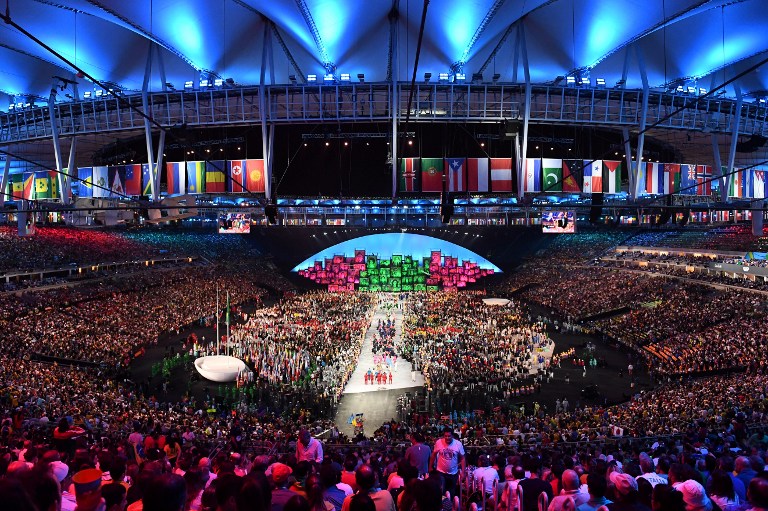
Delegations parade during the opening ceremony of the Rio 2016 Olympic Games at the Maracana stadium in Rio de Janeiro on August 5, 2016. / AFP PHOTO / GABRIEL BOUYS
LONDON—As athletes warm up for the start of the Rio Olympics on Friday, dozens of chefs are preparing for a different kind of challenge: feeding the Brazilian host city’s hungry with excess food from the Olympic Village.
Chefs David Hertz from Brazil and Italian Massimo Bottura, aided by more than 40 colleagues from around the world, aim to turn surplus food from the village in Rio de Janeiro into some 5,000 nutritious meals per day for those in need.
The initiative, RefettoRio Gastromotiva, follows a similar project, Refettorio Ambrosiano, launched by the two chefs last year for the World’s Fair in Milan.
RefettoRio Gastromotiva, a 108-seat restaurant funded by corporate sponsors, will open Monday in the trendy Lapa neighborhood. Its customers will be chosen by charities working in Rio’s poorest
neighborhoods.
The restaurant, which was decorated by renowned Brazilian artist Vik Muniz, with furniture designed by the Campana brothers, icons of Brazilian design, was the brainchild of Bottura, Hertz and journalist Alexandra Forbes.
Making people visible
“I promised my mother I would use my fame to make invisible people visible. The time has come to give back to the world what it has given to me,” said Bottura.
“RefettoRio Gastromotiva is going to work only with ingredients that are about to be wasted … like ugly fruit and vegetables, or yogurt that is going to be wasted in two days if you don’t buy it,” Hertz said, adding that the meals will benefit disadvantaged people, including the homeless.
“We want to fight hunger and provide access to good food,” Hertz said in a telephone interview from Rio.
Between 30 percent and 40 percent of food produced around the world is never eaten because it is spoiled after harvest and during transportation, or thrown away by shops and consumers. Yet almost 800 million people worldwide go to bed hungry every night, according to UN figures.
Hertz said he would like to see the initiative replicated in every city hosting future Olympics. He hopes it will become a movement not only to fight food waste and feed the hungry, but also to provide vocational training for future cooks, bakers and
waiters.
Social change
After the Olympics and Paralympics, Refettorio Gastromotiva will operate as a culinary institute as well as a regular restaurant.
“We want to promote as much change as possible using gastronomy as a tool for social change and social inclusion,” said Hertz, whose Brazil-based organization, Gastromotiva, offers kitchen training for young people from poor families.
“For now it’s still only a dream. We need strategic partners to make this happen. It seems amazing but we need investors.”
Poor Brazilians will also get a taste of Bottura’s dishes without having to pay the usual hundreds of euros that restaurant-goers often shell out when they dine at Osteria Francescana in Modena, Italy, rated the best in the world by Restaurant magazine
this year.
Bottura, a 53-year-old Italian modernist chef, owns the three Michelin-starred restaurant where a typical meal can set diners back by 220 euros.
New tradition
“We have an opportunity with this project, which is cultural, and not a charitable project, to fight wastefulness. If we change the way people think, we can help give birth to a new tradition,” he told a press conference.
His kitchen team will include French chefs Alain Ducasse and Claude Troisgros, Spain’s Andoni Aduriz and Brazilians Alex Atala, Felipe Bronze, Roberta Sudbrack and Rafa Costa e Silva.
They will take turns cooking, setting the menu based on the ingredients available—which will be surplus food, not leftovers.
Rio city hall has granted them the site free of charge for 10 years.
Patrons paying to eat there will also donate a meal to someone in need, under the motto “buy lunch, give dinner,” a spokeswoman said.
Social gastronomy
Hertz, who runs a “social gastronomy” charity in Brazil called Gastromotiva, said the project is more about changing the way people think than feeding them.
“We had never worked with the issue of food waste before. That’s a legacy we’ll leave,” he said.
He is working on similar projects in Los Angeles, New York and Montreal, to open next year.
As many as 500,000 visitors are expected to travel to Brazil for the 31st Summer Olympic Games in Rio de Janeiro, the first Olympics in South America.
The newly built Olympic Village will host more than 18,000 athletes, officials, staff and volunteers over the August 5-21 Olympics and the September 7-18 Paralympics. Reports from AFP and Thomson Reuters Foundation

